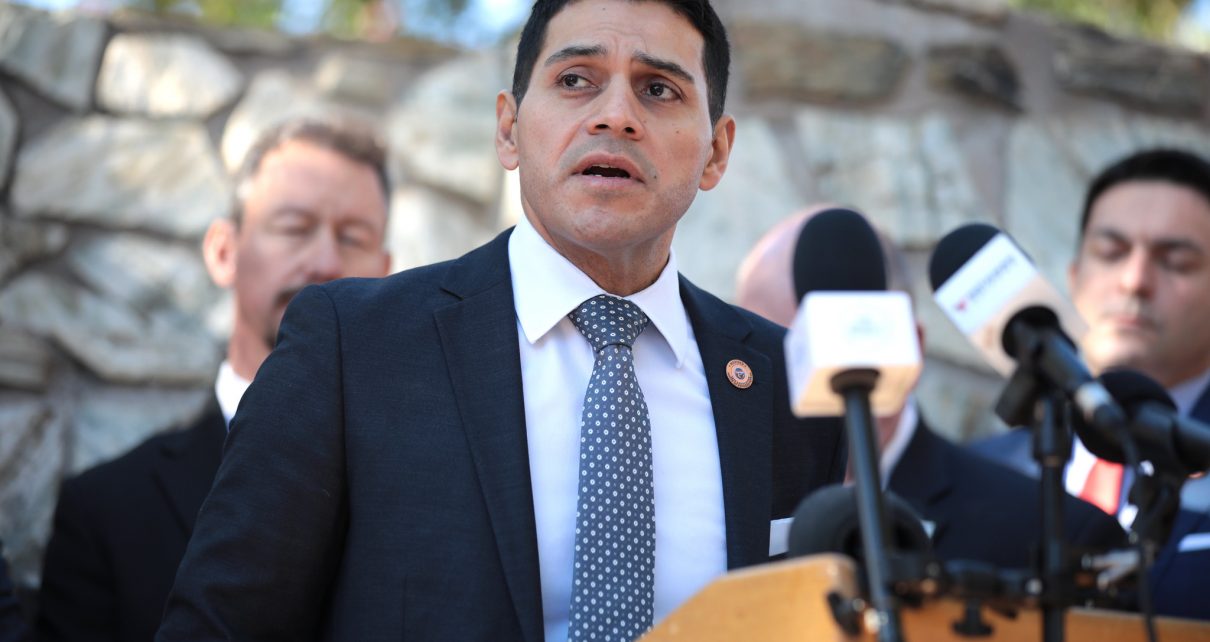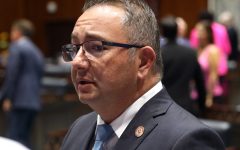
State Representative Steve Montenegro speaking with the media at a press conference hosted by Border 911 at the Arizona State Capitol building in Phoenix, Arizona. (Photo: Gage Skidmore)
Montenegro’s AZ House Speaker Win Sparks GOP Infighting
Election of Montenegro over Chaplik sparks debate over party’s direction
By Christy Kelly, November 16, 2024 9:29 am
Arizona’s Republican Party is at a crossroads, with recent leadership elections exposing deep divisions between grassroots activists and the party’s establishment. The election of Steve Montenegro as House Speaker over grassroots favorite Joseph Chaplik sparked intense debate about the GOP’s direction and priorities. At the same time, Warren Peterson’s re-election as Senate President by acclimation showcases a more unified front in the Senate. These contrasting outcomes highlight the complex dynamics within the party as it prepares for a new legislative session and another round of vetos by Katie Hobbs.
Arizona Senate Leadership
State Senator Warren Petersen announced on social media that he has been re-elected as Senate President by acclamation. “My esteemed colleagues of the AZ Senate have re-elected me by acclamation as Senate President,” Petersen shared.
With the expanded Republican majority, Petersen outlined his priorities: “We will make sure our communities are safe and that our kids have the best educational opportunities possible. We will continue to lower taxes and eliminate government waste.”
He also emphasized the Senate’s commitment to working with federal leadership. “We will work with the Trump administration to make sure our border is safe,” he stated. Additionally, Peterson highlighted goals to address key state issues: “We will secure our water supplies and our elections.”
He also quickly announced the Senate leadership team; Senator Mark Finchem will chair the audit committee, and Senator Jake Hoffman will chair director nominations.
Congratulations to the new leadership team in the @AZSenateGOP!@votewarren @TJShope @AZSenatorShamp @SenFrankCarroll pic.twitter.com/BAooWqtiL5
— AZ War Room (@AZVictoryPAC) November 13, 2024
Upon his reappointment as chair of the Director Nominations Committee, Hoffman emphasized the importance of the Senate’s role in approving state agency directors. “The committee invites Katie Hobbs to come to the table with sane, nonpartisan, qualified nominees, and we will approve them. What we won’t do is rubberstamp unqualified radicals,” Hoffman stated.
This remark highlights the ongoing tensions between Governor Hobbs and the Arizona Senate over the appointment process for agency directors. In 2023, Governor Hobbs attempted to bypass Senate confirmation by appointing individuals as “executive deputy directors” instead of formally nominating them. The Senate challenged her decision in court, and in June 2024, Maricopa County Superior Court Judge Scott Blaney ruled that Hobbs’ actions violated state law. The judge stated that the governor had “improperly, unilaterally appointed de facto directors for these 13 agencies, despite the actual job title she has assigned to each of them.”
The court’s ruling underscored the necessity of Senate confirmation to maintain checks and balances within state government. Following the decision, Governor Hobbs agreed to nominate new agency directors and comply with the confirmation process.
Senator Hoffman reiterated the significance of this process in his press release: “Agency directors have a direct impact on the lives and livelihoods of every single citizen within Arizona. They are tasked with a tremendous responsibility to administer necessary government functions as directed by state law, without attempting to legislate from the executive branch or expand the reach of big government. The Senate confirmation process is a vital and necessary step to ensure that director nominees will faithfully execute the laws of the State of Arizona, free from partisan political agendas or outside influence.”
This controversy underscores the critical role of legislative oversight in safeguarding the integrity and functionality of Arizona’s government.
The Democrats elected Senator Priya Sundareshan as the incoming Democrat minority leader. Sundareshan expressed a desire to find “common-sense, bipartisan agreements” while simultaneously criticizing what she described as “Republican extremism.” This juxtaposition raises questions about the feasibility of achieving bipartisan cooperation when partisan critiques and calls for unity become intertwined.
Incoming Senate Democratic Leader @priya4az ⬇️ #azleg
“Democrats will continue speaking up for the middle class. We believe every Arizonans deserves a fair shot, affordable housing, access to quality education, secure water for the next 100 years, and a livable wage.” pic.twitter.com/fypST8bkNe
— Arizona Senate Democrats (@AZSenateDems) November 15, 2024
Arizona House Leadership
The recent selection of Arizona’s House Speaker has sparked significant debate, particularly among grassroots activists. Merissa Hamilton, a prominent faction member, expressed concerns in her article, “Arizona’s House Speaker Race: People First or Pay-to-Play?” She and other movement leaders endorsed Representative Joseph Chaplik, a member of the Arizona Freedom Caucus, for the Speaker position.
Despite this support, the House did not elect Chaplik. Instead, the House selected Representative Steve Montenegro, a Republican from the West Valley, as the next Speaker of the House. Montenegro, a former pastor and veteran lawmaker, secured the position with 18 votes from 33 voting members in a closed-door meeting on November 12, 2024.
The election of Montenegro over Chaplik has sparked debates about the power dynamics within Arizona’s Republican Party. Critics see it as a clash between grassroots movements and the established political machinery within the GOP.
Adding fuel to the controversy, conservative radio host Garrett Lewis has released what he claims to be the list of Republican legislators who voted for Montenegro. While The Arizona Globe has not independently verified the list’s accuracy, Lewis has doubled down, stating confidently, “The list is 100 percent accurate,” when pressed about his source.
Here is the list of “Republicans” that voted for Sellout @SteveMontenegro to be Speaker instead of @JosephChaplik.
James Taylor
David Livingston
Tony Rivero
Nick Kupper
Michale Carbone
Lupe Diaz
Walt Blackman
Matt Gress
Michael Way
Gail Griffin
Neal Carter
Quang Nguyen
Selena…— Garret Lewis (@GarretLewis) November 14, 2024
Chaplik’s supporters expressed concern and criticism, seeing the vote as a betrayal. However, others argue that Montenegro’s election represents a more unified vision for the party moving forward. The split highlights the ongoing tensions within Arizona’s Republican Party as competing factions wrestle for influence in shaping the state’s conservative agenda.
The question remains: Will the shift in leadership mend divides within the party or deepen existing fractures? Only time will tell as the new legislative session approaches.
Congratulations to the next Speaker of the Arizona House, Steve Montenegro, along with our new party leaders, Republican Majority Leader, Michael Carbone, and Republican Majority Whip, Julie Willoughby.
Under their leadership, the House will deliver common sense solutions for… pic.twitter.com/gSUpHlcIIy
— Matt Gress (@MatthewGress) November 13, 2024
- Nguyen, Petersen Hit Dem Caucus for Iran Stance - March 2, 2026
- Mesnard, Olson Tax Bills to Test Hobbs’ 2026 Veto - January 16, 2026
- Petersen, Montenegro Await SCOTUS ‘Save Women’s Sports’ Outcome - January 13, 2026




